3.3.3. Section II
(1) What is the most common synonym for “grand”?
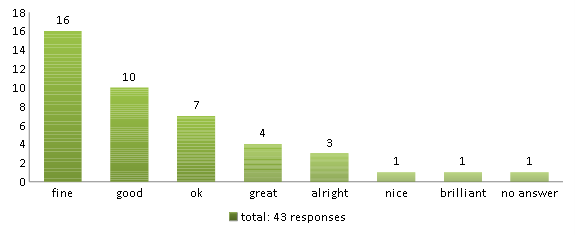
According to the participants’ answers, fine is the most common synonym for grand. This corresponds to the high score of the first two examples in Section I in which grand could be replaced by fine. Furthermore, this result underlines that grand has undergone a major semantic change in Hiberno-English as none of the given OED definitions have been chosen by the informants.
(2) What is the most common synonym for “deadly”?
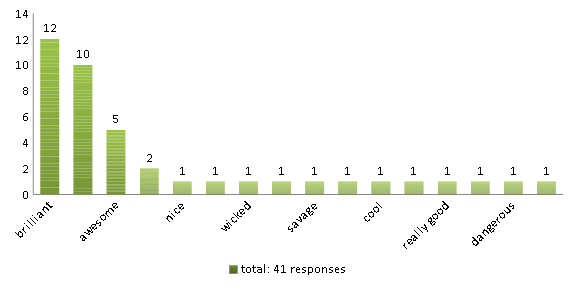
This diagram displays that the meaning of deadly has indeed changed as 93% of the participants have chosen a synonym which has a positive connotation. Thus, brilliant, great and awesome are the most important equivalents for deadly whereas none of these could be found in the OED.
(3) Age of people who would use “grand”
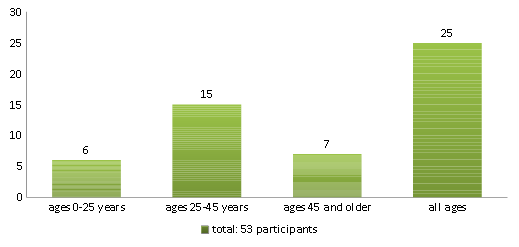
The majority of informants would agree that grand is used by all ages. However, people between 25 and 45 years might use grand more frequently as it gains the second highest score which is in fact twice as much as “ages 0-25 years” or “ages 45 and older”.
(4) Age of people who would use “deadly”
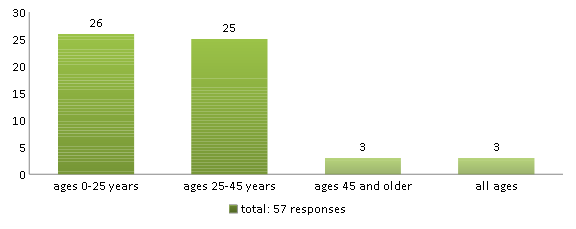
Deadly, on the other hand, is clearly limited to a specific age group. Summarizing the results, one can conclude that deadly meaning ‘brilliant’ is more often used by young and middle-aged speakers since about 90% of the answers are either “ages 0-25 years” or “ages 25-45 years”.
(5) Register of “grand”
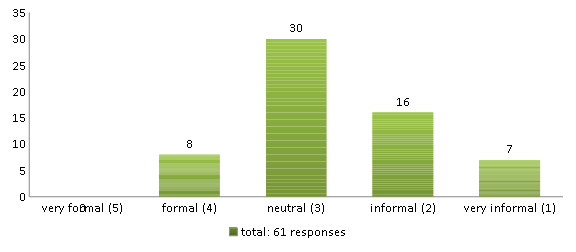
In general, grand can be defined as a neutral term with c. 50 % of the participants choosing this option. However, the average of 2.63 indicates that it still might be slightly informal. This result requires further investigation to find out if grand is maybe more often used in spoken language and therefore considered more informal than formal. Therefore, a corpus analysis of Hiberno-English texts might help to find out whether grand meaning ‘fine’ is also used in written language.
(6) Register “deadly”
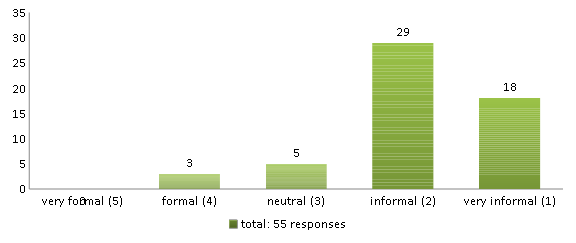
Again, the responses regarding the register of deadly are more clear-cut. Thus, the standard deviation is very low displaying an unanimous participants’ selection, with a majority of 85% choosing either informal or very informal.
(7) Would you consider “grand” or “deadly” typical of the English spoken in Ireland?
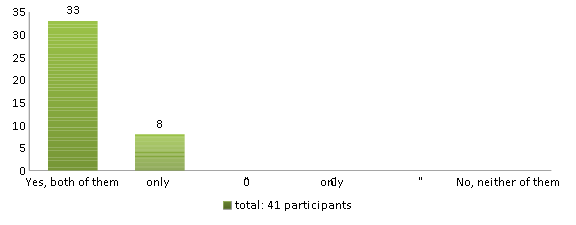
As can be seen from the table above, 80% of the surveyed informants would consider both grand and deadly as peculiarities of the English spoken in Ireland.
(8) Can you think of any other expression which is used in Ireland only?
Hiberno-English Expression |
Meaning |
Participants |
craic(n.) (What’s the craic? Great craic) |
“fun” “What’s going on” |
10/23 |
I’m off my tits. |
“for real, by the way” |
1/ 23 |
gobshite (n.) |
“boaster” |
1/ 23 |
altogether (i.e. “That was great fun altogether) |
intensifier, i.e. “really” |
1/ 23 |
made a bollocks of |
disaster, failure, mess |
1/ 23 |
yoke (n.) |
thing, anything |
1/ 23 |
sound (adj.) (e.g. a sound person) |
good, cool, nice |
1/ 23 |
langer (n.) langers (adj.) |
foolish person drunk |
1/ 23 1/ 23 |
up the duff |
pregnant in trouble |
1/ 23 |
class (adj.) |
good, enjoyable, awesome |
1/ 23 |
savage (adj.) |
amazing, cool, brilliant |
1/ 23 |
Feck it. |
mild swear word |
2/ 23 |
Created with the Personal Edition of HelpNDoc: Single source CHM, PDF, DOC and HTML Help creation